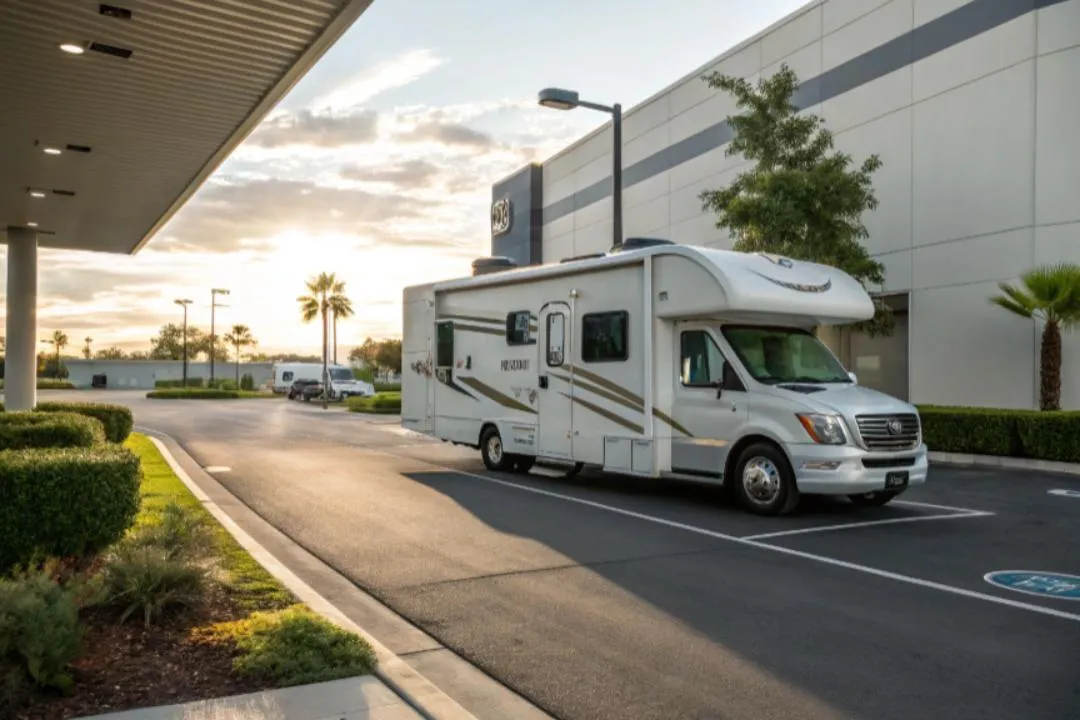
Common Mistakes to Avoid When Registering Your RV
Registering an RV can often feel like you are navigating a maze of confusing state laws, endless paperwork, and unexpected costs. For RV enthusiasts, full-time travelers, and luxury owners, a single oversight can result in massive delays, hefty fines, or thousands of dollars in unnecessary taxes.
However, getting your RV Registration USA sorted doesn’t have to be a nightmare. By understanding the specific challenges from missing documents to complex residency rules you can save time, money, and stress. This guide provides detailed insights into the most common pitfalls and offers practical, step-by-step solutions to ensure your vehicle is road-ready without the hassle.
Why Is RV Registration So Much Harder Than a Car?
Registering a recreational vehicle differs significantly from a standard car because of its unique nature. Motorhomes, travel trailers, and fifth-wheels often require specialized documentation, such as weight certifications, proof of insurance tailored specifically for RV use, and complex title transfers.
State regulations vary widely, creating a "patchwork" of laws. Some states mandate strict emissions tests, while others focus heavily on residency requirements. For full-time RVers, selecting a "domicile state" adds another layer of complexity because it directly affects your taxes and insurance.
If you aren't careful, high-tax states can impose sales taxes of 6% to 9% on your purchase. On a luxury rig, that is a massive financial blow. Additionally, RVs used for full-time living often face stricter rules because they are considered primary residences. If you are struggling to find the right jurisdiction for your lifestyle, you should read our guide on the best states to register an RV to see how choosing the right location can save you thousands.
What Documents Do You Need to Avoid Immediate Rejection?
Incomplete or incorrect paperwork is the number one cause of registration delays. RV registration documentation errors often involve missing critical items like the bill of sale, proof of insurance, or a notarized title.
For instance, omitting a VIN verification form can instantly halt your application because DMVs rely on this to confirm the vehicle’s identity. Another frequent issue is uploading blurry or illegible documents that staff cannot verify.
To avoid these errors, use this checklist before you start:
Title or Manufacturer’s Certificate of Origin: This proves ownership.
Bill of Sale: Must include buyer and seller signatures.
Proof of Insurance: Must meet the state’s minimum liability requirements.
VIN Verification: This often requires a physical inspection by law enforcement or a notary.
Pro Tip: Always scan your documents for clarity rather than just snapping a photo with your phone. If you want a complete walkthrough of the paperwork process, check out our step-by-step guide to registering your RV so you don't miss a single page.
How Can You Prevent RV Title Transfer Nightmares?
Title errors can keep your RV parked for months. Avoiding title issues requires meticulous attention to detail. A surprisingly common mistake is submitting a title with an incorrect odometer reading, which triggers immediate DMV scrutiny.
Missing lienholder information is another major pitfall. If your RV has an outstanding loan, the lienholder must be listed accurately on the paperwork. Without proper notarization, title transfers may also be denied, especially if you bought the RV out of state.
For example, a full-time RVer once faced a two-month delay simply because their title listed an outdated owner name. To prevent this, verify that the VIN on the title matches your RV exactly. If you are worried about making a critical error on your title work, you need to read our article on how to avoid common RV title mistakes before you sign anything.
Are You Overpaying on Registration Fees?

Misjudging registration costs is a painful financial surprise. Common mistakes include underestimating sales tax, which can reach nearly 10% in states like California or New York. On a $100,000 RV, that is an extra $10,000 you might not have budgeted for.
Other overlooked costs include late fees, temporary tag charges, or weight-based registration fees. Some owners also fail to account for domicile state taxes, assuming their home state’s rates apply even when they are traveling.
To avoid overpaying, check for:
Sales Tax Rates: These vary by state (Montana, for example, offers flat-fee vehicle registration).
Weight Fees: Registration costs often go up as the vehicle gets heavier.
Hidden Costs: Look for title transfer fees or plate fees.
For significant savings, many savvy owners opt for flat-fee registration. If you want to keep that extra cash in your pocket, learn about Flat Fee RV Registration in Montana and see why it is the gold standard for RV owners.
How Do Residency Rules Affect Your Compliance?
Failing to meet state regulations can result in fines or invalid registrations. Compliance mistakes often arise from misunderstanding residency requirements. For example, full-time RVers may register in a state where they don’t physically reside, which some states scrutinize heavily.
High-tax states may also impose "use taxes" if your RV is primarily stored in their state, even if it is registered elsewhere. To stay compliant, ensure your insurance policy matches your RV’s usage (e.g., full-time living vs. recreational) and lists any required entities, such as a registration LLC, correctly.
Why Is Accurate Weight Classification So Critical?
Mistakes in weight classification occur when owners misreport their RV’s Gross Vehicle Weight Rating (GVWR). This leads to incorrect fee calculations or failed inspections. For instance, a large Class A motorhome may require a certified weight ticket from a CAT scale, but an inaccurate reading can cause delays.
Some owners assume their RV’s weight based on the manufacturer's brochure, only to find the DMV requires a "wet weight" (fully loaded). To avoid this, visit a certified weigh station and obtain a current weight certificate. Compare the GVWR on your RV’s door jamb label to the certificate and include this in your application.
Is Your Insurance Policy Actually Registration-Ready?
Insurance errors can derail your registration process faster than almost anything else. A common mistake is submitting a commercial policy when a personal one is required, or vice versa.
For full-time RVers, policies must cover continuous use, unlike standard recreational policies that assume the RV is parked most of the year. Another specific error is failing to list a registration LLC as an "additional interest" or "interested party," which is often mandatory for out-of-state registrations in places like Montana.
Why Do Simple Form Typos Cause So Many Rejections?
It sounds simple, but incorrect forms are a frequent cause of rejection. Typos in critical fields like the VIN (Vehicle Identification Number), owner name, or mailing address are common.
Using outdated forms or forms meant for a different county can also lead to delays. For instance, a single digit off on your VIN will result in a mismatch with your title, halting the process immediately. Always download forms directly from the state DMV website to ensure they are current, and double-check every character before hitting submit.
How Do Liens Impact Your Registration Process?
If your RV is financed, the lienholder controls the title. Registration mistakes occur when owners fail to clear or accurately list these lienholders. If your RV has an outstanding loan, the bank's name and address must be correct on the application, or the DMV will reject it.
Some registration types, specifically when moving an RV into an LLC, require the title to be "lien-free" or require permission from the lender. If you are dealing with complex financing situations, you might want to look at our guide on hidden liens on car titles, as the principles often apply to RVs as well.
Can You Skip the Headache of Inspections?
Inspections can be a major hurdle. Failing registration inspections is common in states that require strict emissions or safety checks, especially for older diesel pushers or modified rigs. For example, California mandates smog tests for many motorhomes, and a failed test stops you cold.
Missing inspection deadlines also causes delays. To prevent this, research your state’s requirements early. Better yet, some states (like Montana) do not require vehicle inspections at all. If you are tired of safety checks, this could be a strategic reason to look into what to know before registering your RV in Montana.
How Can You Make Sure You Never Miss a Renewal?

Missing a renewal leads to lapsed registration, which means you are driving illegally. This oversight is common among full-time RVers who lack a fixed mailing address and miss the DMV renewal notice in the mail.
To avoid this, set calendar reminders for your renewal dates. Even better, use a mail-forwarding service so you always get your documents. If you hate the idea of renewing every year, you should know that some states offer permanent plates for older vehicles, eliminating this chore entirely.
Your Reliable Partner For RV Registration Service
When it comes to registering your RV, Street Legal Hookup offers a trusted solution backed by years of expertise. Our team has helped thousands of RV owners navigate complex DMV processes, saving them significant costs through strategic registration in Montana. Unlike traditional methods, our service eliminates inspections, and residency requirements, making compliance straightforward.
A full-time RVer shared, “I saved $10,000 on my motorhome registration, and the process was seamless.” Our secure online platform ensures fast document processing, with plates delivered in as little as three days. With a focus on transparency and client satisfaction, we guide you every step of the way, ensuring your RV Registration USA is handled professionally so you can get road-ready without the stress.
Frequently Asked Questions
How does Montana registration reduce taxes?
Montana offers flat-fee registration on vehicles. Unlike high-tax states charging 6–9%, this can save you thousands on your purchase. For more details on state tax laws, you can visit USA.gov's guide to state taxes.
What documents are required for RV registration?
Generally, you need the current title, a bill of sale, proof of insurance, a VIN verification form, and sometimes a weight certification. Using a checklist is the best way to ensure you don't miss anything.
Can full-time RVers register in Montana?
Yes. Montana does not require you to be a resident to register a vehicle there, provided you set up a Limited Liability Company (LLC) in the state to hold the vehicle. This makes it ideal for full-time travelers.
How long does the registration process take?
With our service, permanent plates typically arrive in 3 to 6 weeks. However, we can often provide temporary tags in as little as one day so you can hit the road immediately.
Are there risks with out-of-state registration?
It is legal to register out of state, but you must comply with your home state's "garage" or "use" laws. If you are concerned about legal definitions of residency, you can read more at Wikipedia's entry on Domicile.
What if my RV has a lien?
If you have a loan, the lienholder must be listed on the registration. For Montana LLC registration specifically, you usually need a release letter or permission from the lender, or the loan must be paid off to transfer the title to the LLC.
Final Thoughts on Avoiding RV Registration Mistakes
Registering your RV doesn't have to be a confusing or costly process as long as you avoid the most common pitfalls. From paperwork errors to compliance oversights and state-specific regulations, each step plays a critical role in getting your RV legally road-ready. Whether you’re a weekend traveler or a full-time RVer, understanding documentation requirements, fee structures, and legal nuances can save you time, money, and unnecessary stress.
By partnering with a reliable service like Street Legal Hookup, you gain expert guidance, faster processing, and a streamlined registration process. Don’t let minor mistakes delay your adventures, take a proactive approach to register your RV in the USA and hit the road with confidence.



